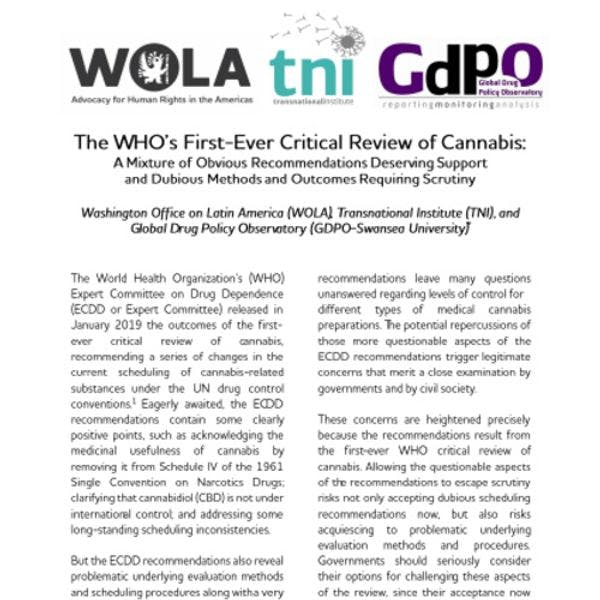La toute première révision critique du cannabis par l'OMS
WOLA, TNI et GDPO discutent des progrès, mais aussi des sérieuses lacunes des recommendations de l'ECDD de l'OMS vis-à-vis de la classification du cannabis. Pour en savoir plus, en Anglais, veuillez lire les informations ci-dessous.
The World Health Organization’s (WHO) Expert Committee on Drug Dependence (ECDD or Expert Committee) released in January 2019 the outcomes of the first-ever critical review of cannabis, recommending a series of changes in the current scheduling of cannabis-related substances under the UN drug control conventions.
Eagerly awaited, the ECDD recommendations contain some clearly positive points, such as acknowledging the medicinal usefulness of cannabis by removing it from Schedule IV of the 1961 Single Convention on Narcotics Drugs; clarifying that cannabidiol (CBD) is not under international control; and addressing some long-standing scheduling inconsistencies.
But the ECDD recommendations also reveal problematic underlying evaluation methods and scheduling procedures along with a very questionable rationale for keeping cannabis in Schedule I. Moreover, the recommendations leave many questions unanswered regarding levels of control for different types of medical cannabis preparations. The potential repercussions of those more questionable aspects of the ECDD recommendations trigger legitimate concerns that merit a close examination by governments and by civil society. These concerns are heightened precisely because the recommendations result from the first-ever WHO critical review of cannabis. Allowing the questionable aspects of the recommendations to escape scrutiny risks not only accepting dubious scheduling recommendations now, but also risks acquiescing to problematic underlying evaluation methods and procedures. Governments should seriously consider their options for challenging these aspects of the review, since their acceptance now could set a damaging precedent for the future. The limitations of the ECDD review also highlight that even far greater progress in bringing the UN drug treaties’ cannabis scheduling in line with modern science will be unlikely to clear the path for legal regulation of non-medical cannabis. Since such an approach remains outside what the drug control treaties permit, countries wishing to regulate cannabis for non-medical use in a way that comports with international law will need to find a different pathway out of the treaty structures. Among the treaty reform options not requiring consensus, the procedure of inter se modification, provided for by the Vienna Convention on the Law of Treaties, appears to offer the most elegant approach.
Téléchargements
Sujets
Régions
Profils associés
- Global Drug Policy Observatory (GDPO)
- Transnational Institute (TNI)
- Washington Office on Latin America (WOLA)
